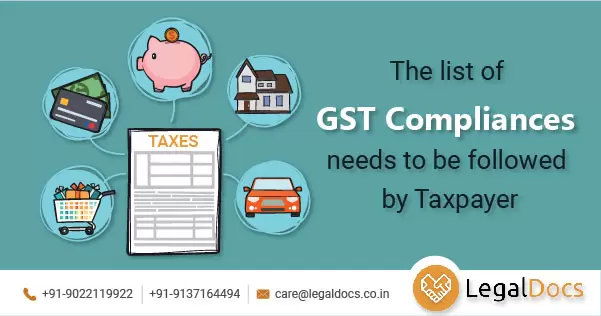GST Complaince Checklist for your Business
As the GST has been imposed after July 1, 2017, it has become mandatory for all businesses to prepare for final stages of implementation of this tax reform. GST is a procedure that is technologically driven. Accurate and timely GST compliances are necessary. One may begin with GST Registration. The whole system of registration is paperless as no hard copies are required for the same. GST Registration is mandatory for every entity if its turnover is more than the exemption limit, which is 20 lakh rupees.
Here are a few actions that a registered GST firm must comply:
One must check the list of goods and services that are exempted from GST and then decide if the goods and services provided by the business are subject to levy of GST.
Generally, it is the supplier who is liable to pay the tax. However, there are many exemptions provided for the same. One must know who will pay the GST in a transaction and how much.
GST is charged on all table supplies at the prevailing rate. For this purpose, one may use HSN code along with the description for classifying the goods.
One of the crucial responsibility of a registered business is correct and timely Filing GST Returns. The time of filing of returns; monthly, quarterly or annually, may depend upon the type of return that is required for the business. Any wrong filling may lead to possible loss to the business.
One may choose to claim input tax credit if the conditions for doing so are fulfilled.
One must keep proper business and accounting records for at least of the past 5 years.
Any change in business circumstances must be informed to the GST authority within 30 days post the change.
In case GST Registration is surrendered or canceled, one must account for GST on business assets held on the last day of the registration.
With the effect of the GST reform in India, many businesses still have gaps in their compliances. Weekly notifications by the government and monthly filing of returns, being a tax-savvy is no longer an option. Nevertheless, businesses require careful management of GST compliances to avoid penalties and fines. This also helps to take advantages of the business opportunities that are being provided by the new tax system.
GST Compliance Checklist for your business
Here is a list of few Compliances that every business must comply after one receives the GST registration number:
Classification of transactions given in the GST scenario: One must identify the transactions most affected by GST. Using HSN/SAC code, one must comply all the transactions as either goods or services. In addition to this, GST has also adopted the Integrated GST or IGST, thereby classifying transactions into interstate and intrastate transactions. It is equally important to consider the frequent changes in tax and its exemptions. This may require reclassifying items at redefined tax rates. Therefore, identifying what will be applicable to one's business will help to move towards its compliance.
Identification of change in businesses at any stage; pre, during and post-manufacturing: One must make a calculation for the ways in which the business would change and operate. GST has made changes in the point of supply and the point where tax liability arises. It is important to understand these changes n order to understand the cash flows. For this purpose, one may need to revise business policies relating to inventory, logistics, and payment accordingly.
GST registration location: All the supply points have to be identified for a GST registered business. One may obtain registration for different business verticals that may fall under a different jurisdiction. This will help to ease GST compliance and further ensure input tax credit.
Inventory and cost management: The cost of inventory is affected post the implementation of GST. The transition of old input tax credit on the existing inventory can be carried forward and offset against GST. The cost of the new inventory is affected by the changes in tax structure and easier filing of input tax credit. In order to ensure accurate cost structure and correct pricing decisions, it is important to ensure changes and reflect them in the system.
Review of existing contracts: Contracts that are existing must be reviewed and compiled under GST in order to avoid penalties, incentives, price changes. Make sure to amend POs and define terms and conditions of the same as per the requirements of GST.
Review suppliers: GST has made the supply chain network more flexible in design. For instance, many small warehouses have now clubbed to bigger. This has resulted in fewer, yet efficient warehouses. It is important to review suppliers in terms of; nature of goods and services, place of supply, and contractual terms.
Account balances and its reconciliations: Reconcile stock on inventory list with complete details relating to quantity, rate and input tax credit. The accounts must be reconciled with the accounts of vendors and customers.
Chart of accounts: Businesses who are involved in the services sector and have PAN India operations, and those involved in e-commerce, must assess requirements and make necessary changes in the chart of accounts.
Place and time of supply: One must be clear regarding the applicable provisions regarding place and time of supply as these may differ with respect to location, industry, and commodities. Although, this may be confusing, is a prerequisite.
Filing GST returns: Timely and accurate filing of returns is crucial to avoid penalties and fees as any misleading information or incomplete data may result in invalid results in the GST network.
GST is not merely a tax reform, rather, it is a business reform too. It has affected business in every possible way including its operations. Taxpayers are trying hard to understand GST and its implications in order to resolve their worries relating to GST compliances. In this fastly changing scenario, one needs to be more proactive in order to avoid and minimize GST-related business disruptions.
Are you looking for New GST Registration in India?
Legaldocs will guide you in getting all necessary Documents and Registration required to get GST Registration in India, Please click on the following link to connect with our consultants.
Apply for GST Registration Knowledge Center
Knowledge Center


























LEAVE A REPLY: